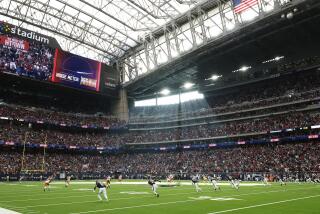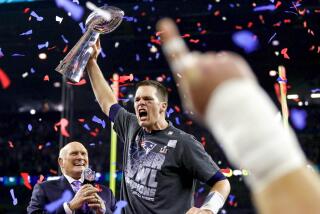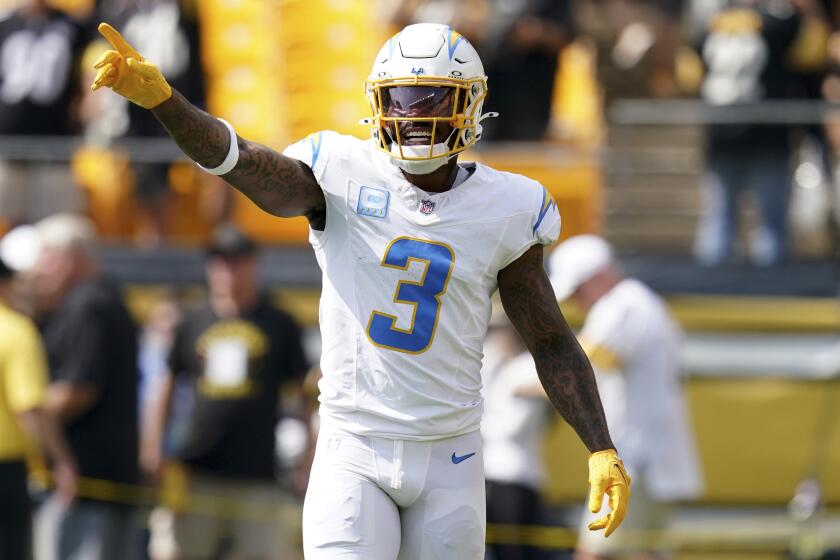Patriots gamble, Colts cash in
From Indianapolis — The NFL has outlawed gambling.
Clearly, New England missed the memo.
The Patriots took one of the biggest, most mystifying gambles in memory Sunday night, and paid the price when it backfired.
In the strangest chapter of their storied rivalry, the Indianapolis Colts scored three touchdowns in the fourth quarter -- the last coming with 13 seconds left -- to beat the Patriots, 35-34, at Lucas Oil Stadium.
The Colts improved to 9-0 and, by getting past their most fearsome threat, claimed the early inside track toward home-field advantage in the playoffs.
The decisive score was set up by a bizarre decision by New England Coach Bill Belichick, one that football fans in Indianapolis, Boston and elsewhere will debate for as long as there are water coolers.
With 2 minutes 8 seconds on the clock, the Patriots were up by six points and facing a fourth and two at their 28-yard line. Instead of punting the ball back to the Colts and making Peyton Manning drive it from his own territory, the Patriots’ offense stayed on the field.
Then, instead of merely trying to draw the Colts offside with a hard count, Tom Brady, in an otherwise empty backfield, took the shotgun snap and fired a pass to Kevin Faulk on his right. Safety Melvin Bullitt instantly made the tackle.
One-yard gain. Turnover on downs.
“We thought we could win the game on that play,” Belichick said, his voice so soft it was barely audible. “That was a yard I was confident we could get.”
They did get one yard. Getting two was the problem.
Manning took over, got the Colts to the one with a pass and two handoffs, then triggered delirium with a quick pass to Reggie Wayne for a touchdown. Matt Stover put the home team up with an extra point.
“Not much surprises me with New England,” Manning said. “When you see them go for it on fourth down, I can’t lie to you, you certainly get a little nervous because you might get a shorter field. But the game might be over.”
The Patriots had time to return the kickoff and run a play, and, like that, it was over.
“Disbelief? No. Disappointment? Yeah,” said Faulk, who came up just short on the fourth-down play. “Especially when you know it was the game-changing play.”
The Patriots could not challenge the spot on the play in question -- although they surely would have wanted to -- because they had no timeouts.
Were it another coach making the decision to go for it, it might somehow be dismissed as the Rule of Dumb trumping the Rule of Thumb. But Belichick is widely considered among the greatest minds in NFL history, a three-time Super Bowl champion who always seems to make the right call at the right time. He’s the guy who once came back to win at Denver after intentionally taking a safety. He’s the only NFL coach to finish the regular season 16-0.
Asked if he understands why people will question the fourth-down call, Belichick shrugged and said, “They question everything.”
Count former Colts coach Tony Dungy among the doubters.
“You have to punt the ball in that situation,” Dungy said in his role as NBC commentator. “As much as you respect Peyton Manning and his ability, and as much as you may doubt your defense, you have got to play the percentages and punt the ball.”
New England’s rationale was that it was so vital to keep the ball out of the hands of Manning, whose killer instinct was only enhanced by his being at home, that it was worth the risk. With his quick-strike capabilities and brilliance at managing the clock, even the thought of him starting deep in his territory was a knee-knocker.
Regardless, it didn’t work, and the Colts wound up winning their club-record 18th consecutive regular-season game -- with a head-scratching memory to savor.
“Whenever you go for it on fourth down in that situation, you’ve got to make a play,” Colts defensive end Dwight Freeney said. “It even happens in video games. You go for it on fourth down when you’re not supposed to, and something bad happens.”
More to Read
Go beyond the scoreboard
Get the latest on L.A.'s teams in the daily Sports Report newsletter.
You may occasionally receive promotional content from the Los Angeles Times.











